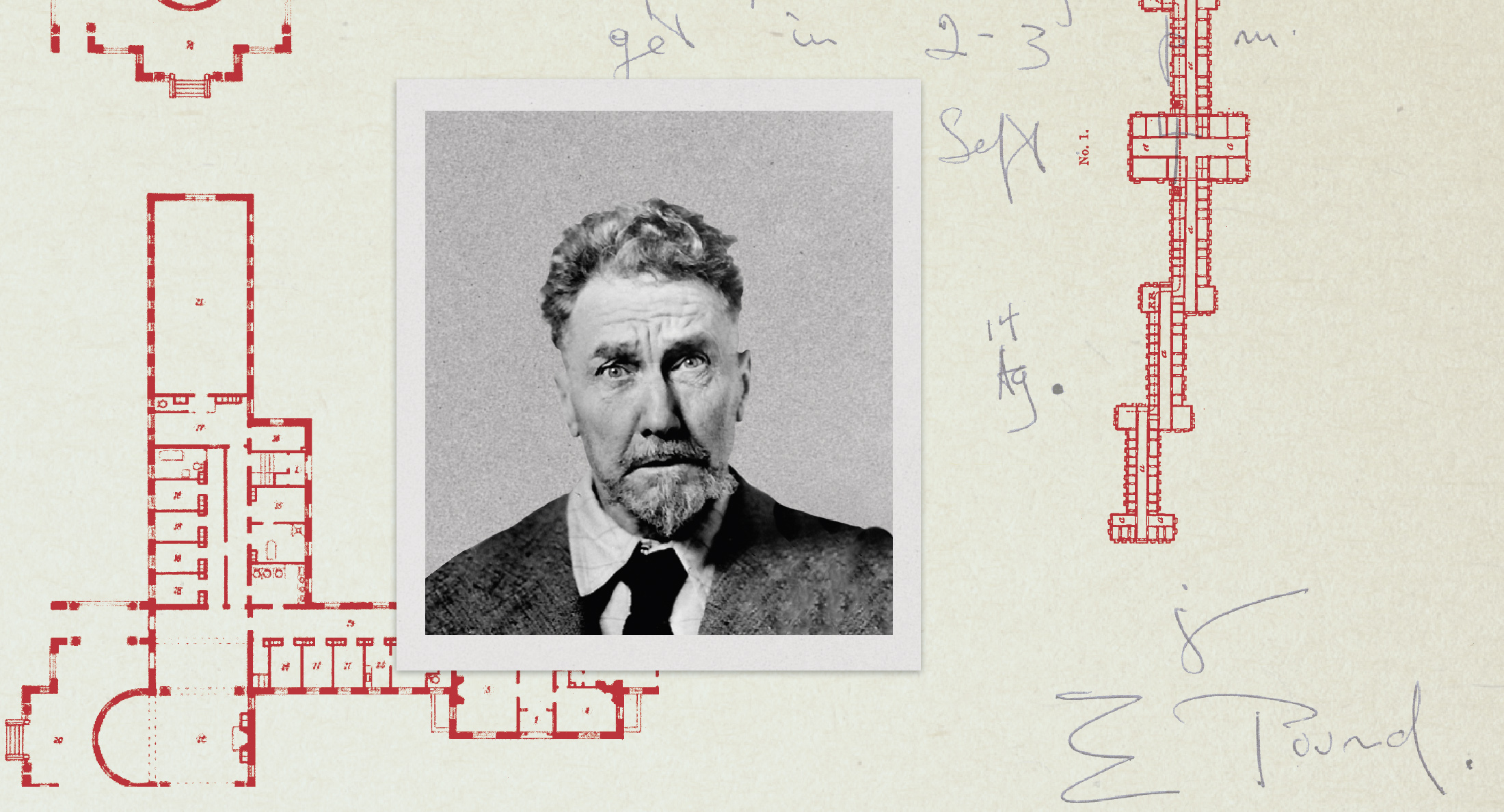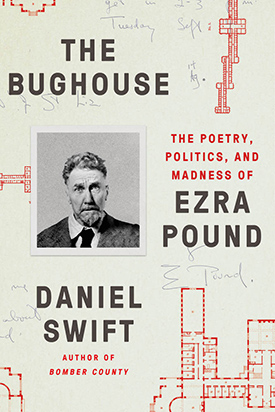Daniel Swift’s The Bughouse tells a gripping story of politics, madness, and modern art in the twentieth century. The book’s focus is Ezra Pound, who was at once a genius and a traitor, a great poet and a madman. In 1945, before standing trial for treason, he was pronounced insane and sent to St. Elizabeths Hospital. The following excerpt details the relationship forged between Pound and his eager apprentice Robert Lowell and illuminates the way the hospital became an unorthodox literary salon. Swift traces Pound’s experience through the eyes of his visitors, and this in-depth look at the politics and prejudices of this divisive figure is timelier than ever.
It is March 1954 and Robert Lowell is up again. Each time it is the same. He starts by reading Mein Kampf and talking, talking to anyone who will listen, about Hitler and the fascists. Then he leaves his wife and runs away with a younger woman. Then he writes to Ezra Pound, one monster to another.
His letter begins suddenly. ‘I have been meaning to write you for some time, and it is better that I gabble on, and write badly, than that I say nothing,’ he explains. He has just returned from Italy, where he went to collect his mother’s body. She died in Rapallo, where Pound had lived before the war, and at the clinic where the corpse was kept he ran into Pound’s old doctor. ‘I was very close to you,’ Lowell writes: ‘And I think I know better now my old friend, the man under the masks.’ He includes a new poem and Pound replies with a few kind words, and Lowell writes back. He has been thinking about Latin, and translations, and he asks whether Pound might send him his new book, The Classic Anthology Defined by Confucius, which has just been published. He cannot buy a copy, he announces in a lurching transition, because he is getting divorced. When he finishes typing this letter he has another thought and scrawls at the top of the page: ‘Hardy & Browning are good company.’ His best companions now are poets, dead and living.
The letters Lowell wrote to Pound in the spring of 1954 are a terror to read because they are so raw; you can feel how fast he is typing, can feel the speed and the fear.
The letters Lowell wrote to Pound in the spring of 1954 are a terror to read because they are so raw; you can feel how fast he is typing, can feel the speed and the fear. Five days later he writes again, this time without waiting for a reply. ‘Uncle Ezra,’ this next letter begins: ‘Pardon this spate of letters, but for the moment you speak my language.’ He announces a breakthrough. He is thirty-seven years old and he has always written poems in formal poetic measures, often iambic pentameter, but now he is going to abandon what he calls ‘Jambics’. He includes a terrible poem he has just written, with the title ‘Adolf Hitler von Linz’, and what it says matters less than how he says it. Forty years before, the young Pound and Eliot had rebelled against the conventions of poetry by rejecting set formal measures. ‘To break the pentameter, that was the first heave,’ Pound wrote of this rebellion, and now Lowell is doing it again.
From the start their relationship was zigzag repetition. When Lowell was a freshman at Harvard in 1936 he met the glamorous older student James Laughlin, who told a story about how he had gone and studied under Pound in Rapallo, and Lowell decided he would like to do that too. In careful square handwriting he composed a long letter to Pound. ‘I want to come to Italy and work under you and forge my way into reality,’ he explained. There is something medieval about both his desire and the words in which he describes it. He wants to be an apprentice, and he writes ‘I pray you to take me!’ and he promises ‘I will bring the steel and fire.’ Pound’s reply is dismissive; Lowell writes back immediately. ‘Of course I don’t actually know you,’ he admits, ‘but I have felt increasingly enthusiastic about you for some time.’ He quotes Pound’s poems alongside Shakespeare; he flatters. ‘I have no delusions as to your bulk and my smallness,’ he ends: ‘I am only trying to show you more clearly why I wish to become your disciple.’ Pound did not write back.
Their next exchange was in September 1947, and by then their roles had shifted. During the war Lowell had written a public letter to the president, in which he denounced the war and refused to be drafted into the army. He was put on trial and in October 1943 was sentenced to the Federal Correctional Center in Connecticut. He did mild manual labour for five months and spent the following summer mopping the floors of a hospital in Bridgeport for the remainder of his sentence, and in this curious paraphrase of Pound’s own progress from prison to hospital Lowell also became a poet. His volume of poems Lord Weary’s Castle was published in December 1946 and met with immediate praise and prizes, and the following June he was invited to Washington to become Consultant in Poetry at the Library of Congress. Once he arrived in Washington, Lowell wrote to Pound to tell him that he would visit. ‘During the war, I spent a few months in jail as an objector,’ he adds, ‘so I suppose we have a little of that in common.’
During his year in Washington, Lowell often went out to St Elizabeths. He sometimes took other poets along—Elizabeth Bishop, John Berryman, Randall Jarrell—and something of the hospital stayed with him. After he left Washington he went to Yaddo, the writers’ colony in Saratoga Springs, and he wrote to Pound that he felt he was in ‘a sort of St Elizabeths without bars’. He imagined they were still sharing the same space. Jail time and scolding the president was not all they had in common. At the start of 1949 Lowell was beginning to crack up: seeing conspiracies and Communist spies, writing letters, drinking. In March, in Chicago, he was arrested for obscenity. A few days later he punched a policeman in Bloomington, Indiana, and he was tied up in a straitjacket and sent to a private hospital in Massachusetts, where they put him in a padded cell behind three locked doors and gave him electroshock treatment. In May, when he heard what had happened to Lowell, Pound suggested that he might like to come to St Elizabeths instead, and offered to make room on the ward.
Pound was, he wrote to a friend, a marvellous monster.
There is a pattern here, even while Lowell was so wild. When he got his first divorce, in 1948, the lawyer he hired was Julien Cornell, and before he went to Europe in September 1950 he wrote to Pound to ask what he should see. He stayed in Europe for two years and reread the Pisan Cantos. Pound was, he wrote to a friend, a marvellous monster. Lowell spent the winter in Florence and in a poem he later wrote about the city he commands:
Pity the monsters!
Pity the monsters!
Perhaps, one always took the wrong side—
and he confesses, ‘My heart bleeds black blood for the monster.’ Lowell’s poems are marked by a radical and occasionally wretched sympathy. He imagines himself always to be elsewhere, in another place or another person, and he presents his feelings as too tenderly in touch with all around, as if it were too much for a sane man to handle in just one body. You can open his thousand-page Collected Poems almost at random and find the saddest intimacy. ‘I want you to see me when I have one head / again, not many, like a bunch of grapes,’ he wrote in a late poem about his hospital times:
yet even on the steadiest day, dead noon,
I have to brace my hand against a wall
to keep myself from swaying—swaying wall,
straitjacket, hypodermic, helmeted
doctors, one crowd, white-smocked
When he got back from Europe in 1953 he went to Pound again. ‘He’s much fatter and healthier, jumps about, dances like a bear,’ Lowell reported to his new wife Elizabeth Hardwick, and he is talking about both Pound and himself, as if the two were one. Lowell invented an alter ego who was a bear called ‘Arms’ or ‘Arms of the Law’, and when Lowell was manic then Arms would come out to play: roaring, wild hugging, dancing. This was Lowell’s name for his madness, and he saw the bear in Pound.
Robert Lowell presents a different style of visit, for each time he went to jail, or hospital, or to write, he was always visiting a St Elizabeths of the mind. It was everywhere. ‘You speak my language,’ he told Pound, and years later, in 1963, when he heard that Pound had been depressed Lowell sent him a letter. ‘I think there are times that cannot be softened or explained off,’ he wrote: ‘I sympathize and suppose I’ve lived in the same cellar for moments.’ Down in the dark place they were all the same, a single twisting man.
Daniel Swift teaches at the New College of the Humanities in London. His first book, Bomber County, was long-listed for the Samuel Johnson Prize and the Guardian First Book Award, and his essays and reviews have appeared in The New York Times, the New Statesman, and Harper’s Magazine.

